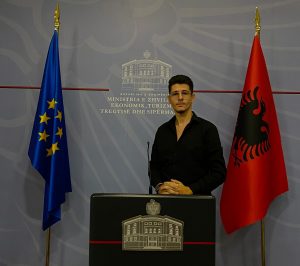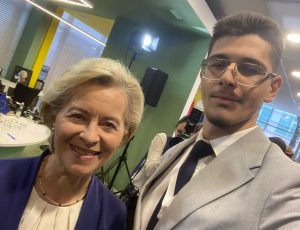Written by Jonas Kepi
Reading time: 7 minutes
The Western Balkan Region
The Western Balkans region consisting of; Albania, Bosnia and Herzegovina, Kosovo, Montenegro, North Macedonia and Serbia has long been known for its diverse cultures, historical complexities, and geopolitical challenges. Amidst these dynamics, the youth of the Western Balkans stand as a beacon of hope, resilience, and determination. In this article, we will explore the unique qualities and experiences of the youth in the Western Balkans, highlighting their aspirations, struggles, and the potential they hold for shaping a brighter future.
Navigating a Complex Legacy
The youth in the Western Balkans have inherited a complex historical legacy, marked by conflicts and political transitions. They have grown up in the aftermath of turbulent times, witnessing the challenges faced by their societies. However, rather than being burdened by the past, the youth are motivated to break free from its shackles and forge a path towards progress and stability.
Education (both formal and non-formal) plays a pivotal role in empowering the youth of the Western Balkans. Despite various obstacles, such as outdated curricula and limited resources, young people in the region are eager to learn and acquire knowledge. They understand the transformative power of education and are increasingly seeking opportunities for higher education, vocational training, and international exchange programs. By investing in their education, they are equipping themselves with the skills and knowledge necessary to their societies.
Entrepreneurship and innovation are gaining momentum among the youth in the Western Balkans. Faced with limited employment opportunities, many young people are choosing to create their own paths by starting their businesses. They are leveraging technology, creativity, and resourcefulness to develop innovative solutions and drive economic growth. By embracing entrepreneurship, the youth are not only creating jobs but also challenging traditional norms and contributing to the diversification of their economies.

EU-Balkan Conference
Active Citizenship and Social Engagement
The youth in the Western Balkans are actively engaging in civic life and advocating for social change. They are joining youth organizations, civil society groups, and grassroots movements to address pressing issues such as corruption, social inequality, and environmental sustainability. Through their collective action and social engagement, they are amplifying their voices and demanding a more inclusive and participatory society.
The increasing participation of young individuals in civic life is evident. By casting votes, attending town hall meetings, and partaking in policy discussions, they are asserting their role in shaping the destiny of their respective nations. Recognizing the power of political participation, these youths are ensuring that their concerns, hopes, and aspirations are integrated into the fabric of national policies.
One of the most prominent EU initiatives, the Erasmus+ Programme, offers opportunities for young people from the Western Balkans to study, volunteer, and gain work experience in EU countries. This exchange fosters intercultural understanding, builds skills, and strengthens the ties between the Western Balkans and the EU.
Bridging Divides and Fostering Regional Cooperation
The Western Balkans region is characterized by historical divisions and geopolitical complexities. However, the youth are working tirelessly to transcend these barriers and foster regional cooperation. They are engaging in cross-border initiatives, cultural exchanges, and youth networks to build bridges and promote mutual understanding. By nurturing connections and fostering dialogue, they are paving the way for a more integrated and harmonious Western Balkans.
With their young forward-looking perspective and resilience, have shown a steadfast determination to transcend historical barriers that once divided their forefathers. Their quest is not just to coexist but to actively collaborate, celebrating their shared history and cultural ties while respecting their unique differences.
A prime example of this is the surge in cross-border initiatives spearheaded by young leaders. Recognizing the power of collective action, they have initiated projects that span across national borders, tackling regional challenges – from environmental conservation to fostering entrepreneurial spirit. Such endeavors not only provide tangible benefits but also forge strong interpersonal bonds that stand as a testament to the power of collaboration over division.
Furthermore, cultural exchanges have gained momentum, serving as a platform for youths from different countries to immerse themselves in each other’s traditions, arts, and lifestyles. Through dance, music, literature, and culinary experiences, they are rediscovering the intertwined roots of their shared heritage. Such exchanges dismantle stereotypes, challenge prejudices, and cultivate a genuine appreciation for the rich tapestry of cultures that the Western Balkans embodies.
Political Literacy for Youth; Project D.R.E.A.M.LAND
Political literacy among youth in the Western Balkans plays a critical role in shaping the future of the region, which has a complex political landscape due to its history of conflict and ongoing processes of democratization and integration with European institutions. Therefore, our recent KA3 Transnational Erasmus Project D.R.EA.M.LAND is combining both other EU member-states and the Western Balkans. Here are several aspects that highlight the importance of political literacy in this context:
- Informed Decision-Making: Political literacy enables young people to make informed decisions about their leaders and policies, hence we have partnered and incorperated up with one Western Balkan country; North-Macedonia in our recent KA3 Erasmus Transnational Project D.R.E.A.M.LAND.
- Active Citizenship: A politically literate youth is more likely to engage in civic activities, from voting to participating in public debates and community service. Which our project is also focus on teaching youth.
- EU Integration: As countries in the region aspire to join the European Union, political literacy helps youth understand the requirements for EU membership, the benefits and responsibilities it entails, and how their countries must reform to align with EU standards. Therefore, European Programmes are important to take part in.
- Economic Development: Understanding political and economic policies is essential for youth who will enter the workforce and become the region’s entrepreneurs, professionals, and leaders.
- Combating Corruption: Political literacy can empower the youth to hold their governments accountable, which is particularly important in the Western Balkans where many countries face challenges with corruption and governance.

The 13th president of the European Commission since 2019 – Ursula von der Leyen
Hope for the Future
The youth of the Western Balkans embody resilience, creativity, and a determination to shape their own destinies. They are overcoming the challenges posed by their complex history and are actively working towards a better future. Through education, entrepreneurship, civic engagement, and regional cooperation, they are driving positive change in their societies. It is crucial for stakeholders, including governments, institutions, and the international community, to recognize the potential of the youth in the Western Balkans and provide them with the support, resources, and opportunities they need to thrive. By investing in the youth, we invest in a prosperous and harmonious future for the Western Balkans.
 “Jonas is a motivated and passionate individual with experience in various fields, including Diplomacy , Business and marketing. As the founder of Tech Point and a participant in the first edition of Travel Fest, Jonas is always seeking new challenges and opportunities. Board Member, as well as an experienced editor and board member at EU Solidarity Corps and an Official Member of YATA (NATO) International also in Albania. currently the Official member of EYP Albania currently Marketing Specialist at LDA department of Marketing and PR”
“Jonas is a motivated and passionate individual with experience in various fields, including Diplomacy , Business and marketing. As the founder of Tech Point and a participant in the first edition of Travel Fest, Jonas is always seeking new challenges and opportunities. Board Member, as well as an experienced editor and board member at EU Solidarity Corps and an Official Member of YATA (NATO) International also in Albania. currently the Official member of EYP Albania currently Marketing Specialist at LDA department of Marketing and PR”

